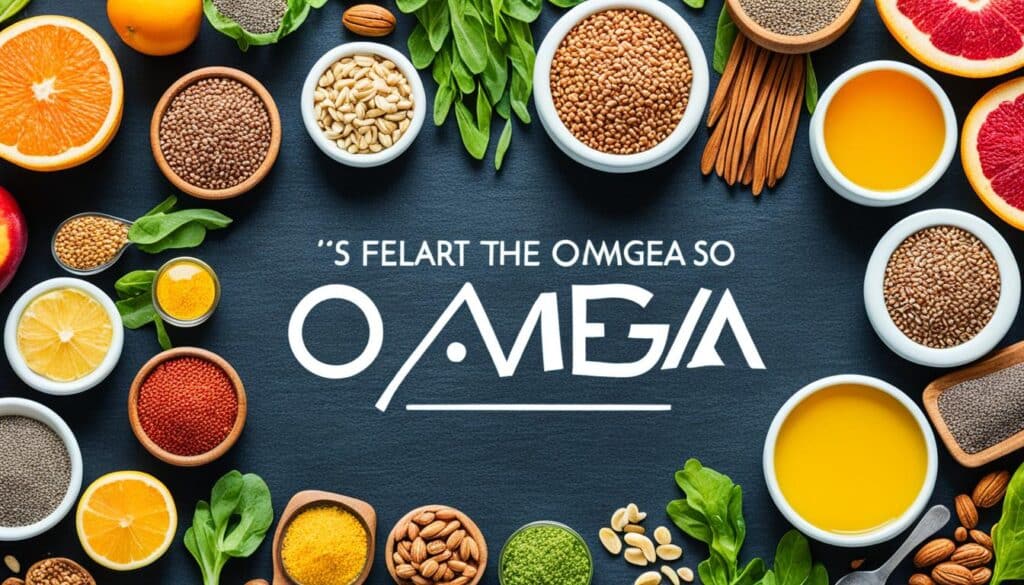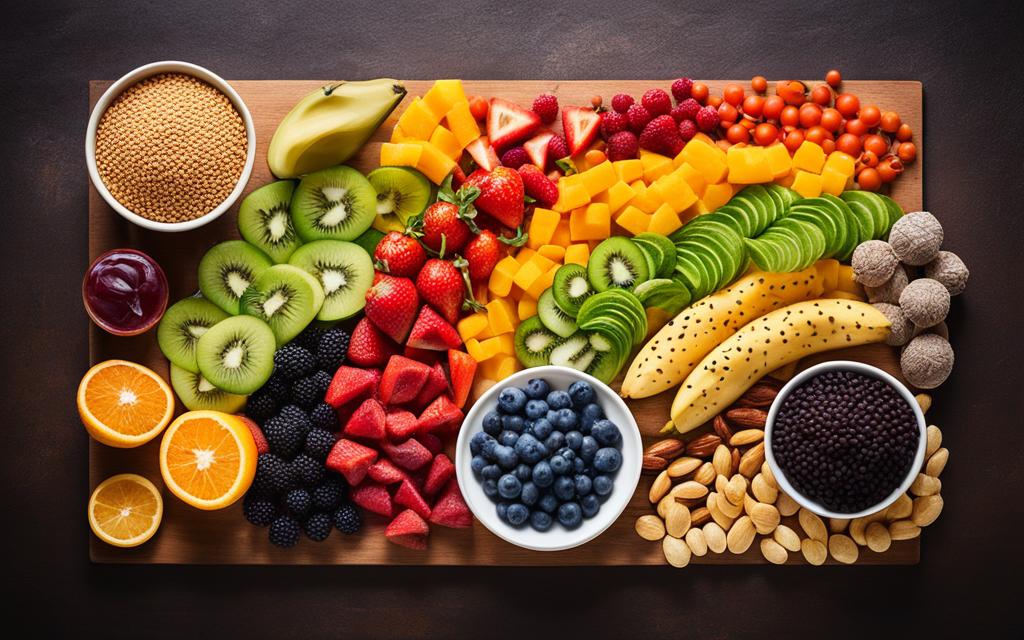Thriving on Plants: A Guide to Plant-Based Diet Essentials
Did you know that plant-based diets have experienced a staggering 400% increase in popularity over the past decade?
Embracing a plant-based lifestyle goes beyond just excluding animal products. It is a commitment to healthier living, ethical choices, and a positive impact on the environment. But with the complexity of nutritional planning, it’s crucial to navigate the intricacies of plant-based nutrition to ensure you meet your body’s needs.
In this guide, we will provide you with essential information on macronutrients and micronutrients, tips for transitioning, and a plethora of vegan and vegetarian recipes to keep your meals exciting. Whether you’re a newcomer or a long-time vegan, this guide will equip you with the knowledge and tools to maintain a well-rounded and thriving plant-based diet.
Ready to unlock the health benefits of a plant-based diet? Let’s dive in!
Macronutrients in a Plant-Based Diet: Proteins, Fats, and Carbohydrates
Macronutrients play a crucial role in providing energy, supporting growth and development, and maintaining overall bodily functions. In a plant-based diet, it is important to ensure an adequate intake of proteins, fats, and carbohydrates to meet your nutritional needs.
Proteins
Proteins are made up of amino acids, which are the building blocks of our body. While animal products are often considered complete protein sources, plant-based foods can also provide all the essential amino acids your body needs. Examples of protein-rich plant foods include lentils, beans, chickpeas, tofu, tempeh, and seitan. To ensure you’re getting a variety of essential amino acids, it’s beneficial to combine different protein sources in your meals.
Healthy Fats
Healthy fats are essential for brain health, hormone production, and nutrient absorption. In a plant-based diet, you can obtain healthy fats from sources such as avocados, nuts, seeds, and oils like flaxseed, olive, and coconut oil. These fats also contain Omega-3 fatty acids, which are beneficial for heart health and can contribute to reduced inflammation in the body.
Carbohydrates
Carbohydrates are the primary source of energy for our bodies. In a plant-based diet, carbohydrates can be obtained from whole grains, fruits, vegetables, and legumes. These foods provide a wide range of essential nutrients, including vitamins, minerals, and dietary fiber. It is important to consume carbohydrates in their whole form to ensure a sufficient intake of fiber, which promotes healthy digestion and helps regulate blood sugar levels.
A well-balanced plant-based diet should include a variety of proteins, healthy fats, and carbohydrates to ensure you’re getting all the nutrients your body needs. By incorporating a range of plant-based foods into your meals, you can thrive on a plant-based diet while enjoying a wide array of flavors and nutritional benefits.
Micronutrients in a Plant-Based Diet: Vitamins, Minerals, and Antioxidants
Certain vitamins and minerals play a crucial role in maintaining a balanced and healthy plant-based diet. While these micronutrients may be more challenging to obtain solely from plant sources, with proper planning and understanding, you can meet your nutritional needs.
Vitamins
Vitamin B12: Vitamin B12 is primarily found in animal products, so it’s important for individuals on a plant-based diet to ensure adequate intake. You can obtain Vitamin B12 through fortified foods like plant-based milks, cereals, and nutritional yeast, or by taking supplements.
Vitamin D: Vitamin D is essential for bone health and immune function. Although sunlight is the best source of Vitamin D, it may be challenging to obtain enough without adequate exposure. Fortified plant-based milks and cereals, mushrooms, or taking supplements can provide the necessary levels.
Minerals
Iron: Iron is crucial for oxygen transport and energy production in the body. While plant-based sources of iron, such as legumes, leafy greens, nuts, and seeds, are available, consuming iron-rich foods alongside vitamin C-rich foods can enhance absorption. Additionally, iron-fortified cereals and breads can be good sources of iron.
Calcium: Calcium is necessary for strong bones and teeth. Plant-based sources of calcium include fortified plant milks, tofu made with calcium salts, and dark leafy greens like kale and collard greens.
Iodine: Iodine is important for proper thyroid function and brain development. Plant-based sources of iodine include seaweed, iodized salt, and iodine-fortified foods.
Zinc: Zinc is essential for immune function, wound healing, and DNA synthesis. Legumes, nuts, seeds, and whole grains are good plant-based sources of zinc.
Antioxidants and Omega-3 Fatty Acids
Antioxidants: Antioxidants help protect against oxidative stress and inflammation. Fruits, vegetables, and whole grains are rich sources of antioxidants, providing a wide range of health benefits.
Omega-3 Fatty Acids: Plant-based sources of Omega-3 fatty acids include flaxseeds, chia seeds, hemp seeds, and walnuts. These sources provide ALA (alpha-linolenic acid), which the body can convert into the more beneficial forms, EPA and DHA. However, algae-based supplements may be necessary to ensure sufficient intake of EPA and DHA.
Here is a visual representation of micronutrients in a plant-based diet:
| Nutrient | Plant-Based Sources |
|---|---|
| Vitamin B12 | Fortified plant-based milks, cereals, nutritional yeast, supplements |
| Vitamin D | Fortified plant-based milks and cereals, mushrooms, supplements |
| Iron | Legumes, leafy greens, nuts, seeds, iron-fortified cereals and breads |
| Calcium | Fortified plant milks, tofu made with calcium salts, dark leafy greens |
| Iodine | Seaweed, iodized salt, iodine-fortified foods |
| Zinc | Legumes, nuts, seeds, whole grains |
By incorporating these micronutrients into your plant-based diet, you can ensure you’re meeting your body’s needs while reaping the many health benefits of a plant-based lifestyle.
Conclusion
A plant-based diet offers numerous health benefits, making it a compelling choice for those seeking improved well-being and a sustainable lifestyle. By embracing a plant-based diet, you can enjoy the ease of weight management, reduce the risk of diseases such as heart disease and Type 2 diabetes, and even lower the chances of certain types of cancer. Furthermore, adopting a plant-based diet contributes to a lighter environmental footprint and often leads to cost savings on groceries.
Transitioning to a plant-based diet can seem overwhelming at first, but it doesn’t have to be. Incorporating a wide variety of plant-based proteins, fats, carbohydrates, vitamins, minerals, and antioxidants into your meals is a great way to ensure a balanced and fulfilling diet. Experiment with ingredients such as legumes, tofu, nuts, seeds, and whole grains to diversify your culinary experiences and maximize your nutritional intake.
If you’re looking for assistance and inspiration on your plant-based journey, resources like Vegan Easy provide valuable guidance. They offer support and personalized meal plans to help tailor your diet to your individual goals, whether it’s building muscle, enhancing endurance, or simply improving your overall well-being. By following a plant-based diet, you can thrive both physically and ethically, achieving your health and fitness aspirations while making a positive impact on the planet.















Post Comment